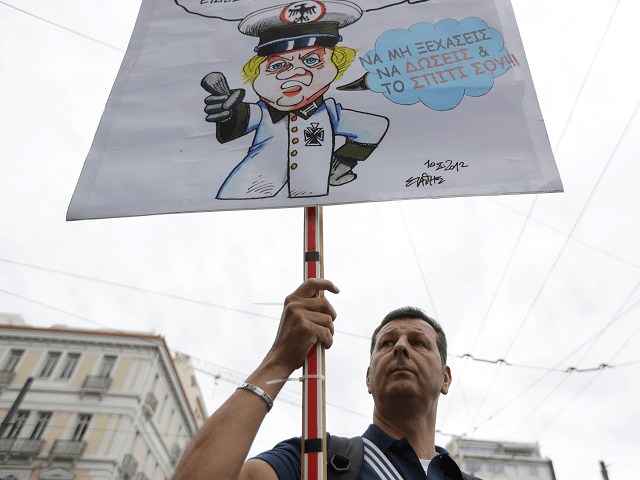ATHENS, Greece (AP) – A nationwide general strike disrupted services across Greece Wednesday, as lawmakers were set to approve another batch of reforms that will impose years more hardship on austerity-weary Greeks.
Unions called the strike to protest new belt-tightening measures that will be imposed beyond the end of Greece’s third bailout next year, including pension cuts and tax hikes. The left-led coalition government agreed to the reforms as part of a deal with the country’s international creditors to release funds from its bailout.
Without the cash, Greece would once more struggle to meet a spike in debt repayments due this summer and face another brush with bankruptcy.
Thousands of protesters were marching through central Athens toward parliament in a series of demonstrations as part of the strike.
“No to the new looting of salaries and pensions,” civil servants union ADEDY said.
Police unionists hung a giant banner off the side of Lycabettus Hill in the center of Athens, with a slogan in German and Greek reading “how much is the life of a Greek policeman worth?”
Public hospitals were functioning with emergency staff only, while public transport was disrupted, leaving many main roads gridlocked in the capital. Intercity trains were not running, and there was no subway service between Athens airport and the city. Courts were shut while lawyers and notaries public backed away from official duties, and customs and local government offices were closed.
Air traffic controllers were holding a four-hour work stoppage in the middle of the day, leading to the rescheduling or cancellation of more than 150 flights. Ferries were also tied up in port until late Friday after seamen began a four-day strike Tuesday.
In parliament, lawmakers were debating the measures that include additional pension cuts in 2019 and higher income tax from 2020, ahead of a Thursday midnight vote.
On the streets of Athens, opinions on the strike diverged.
“It doesn’t make a difference whether you strike or not. All the measures will pass anyway,” said Apostolos Seitanidis as he walked in the city center.
But another Athenian, Panagiotis Adamopoulos, disagreed.
“Every strike is a holy thing,” he said. “If we dismiss it, surely we’ll end up getting 300-euro ($330) salaries and 200-euro pensions.”
Unions and the opposition have compared the new measures to those of a fourth bailout, but without the corresponding funding from international creditors. The government, which originally came to power in 2015 promising to repeal previous austerity measures, has vehemently rejected the accusation, emphasizing that it will also take other measures to relieve poverty.
Prime Minister Alexis Tsipras spoke Tuesday morning with German Chancellor Angela Merkel, whose country has been the single largest contributor to the Greek bailouts, and discussed the issue of Greece’s debt, his office said Wednesday.
Athens has long argued its debt is unsustainable, and has been seeking debt relief as a means of getting its economy back on track. While the International Monetary Fund has agreed the country needs debt restructuring, the idea has met with resistance from European creditors, particularly from Germany.
Struggling through a deep financial crisis, Greece has been dependent on rescue loans from other European countries using the euro, and the IMF, since its first bailout in 2010.
In return, successive governments have imposed repeated waves of reforms, which have included steep tax hikes and salary and pension cuts.
While the country’s finances have improved under the bailouts, the belt-tightening has led to spiraling poverty. Unemployment, while down from highs of above 27 percent, hovers at around 23 percent.

COMMENTS
Please let us know if you're having issues with commenting.